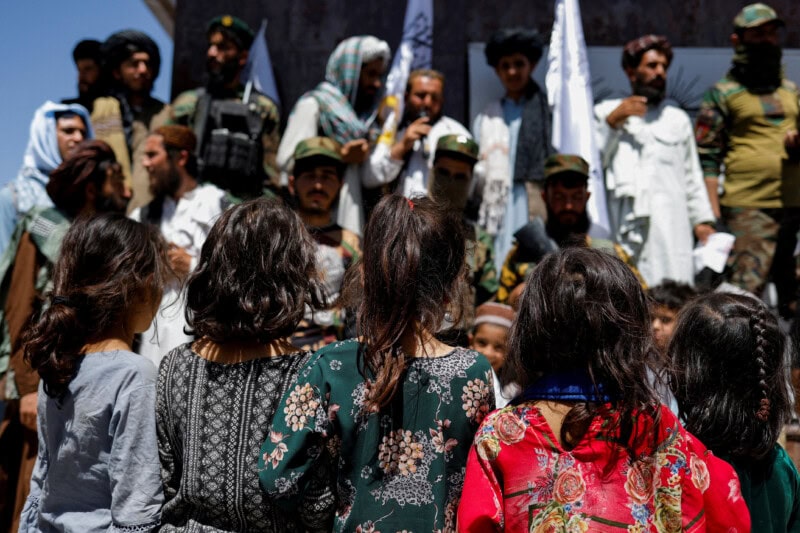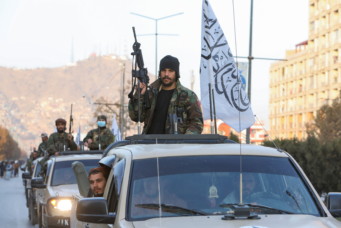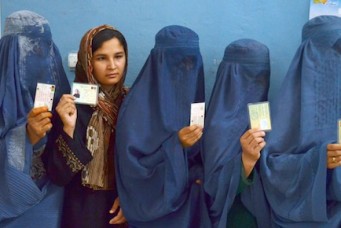Sticks and Stones: The Taliban’s War Against Women
The world has bookmarked the Taliban as a problematic but mostly benign thorn in the side of global society. For women in Afghanistan, however, the threat is all-encompassing

In March of this year, the Taliban published an audio recording of one of its leaders, Haibatullah Akhundzada, vowing to reintroduce public stoning against women charged with adultery. He claimed this decision was the latest stage in the Taliban’s “war” against the West, which he declared would continue for decades to come.
The Taliban has violently utilized religion as a tool to systematically perpetuate the economic, legal, and physical subjugation of women. This practice engenders an oppressive social environment which leaves women without the means to escape. The international community, which rallied around the protests in Iran following the death of Mahsa Amini in 2023, has remained largely silent on the women’s security crisis raging in Afghanistan. Attempting to bring the world’s attention back to the Taliban’s war against women amid the current state of global polycrisis feels akin to screaming into the void.
Public Stoning and Sharia Law
The use of public stoning as a legal punishment is rooted, as with all of the Taliban’s judicial and legislative frameworks, in a strict, literal interpretation of Sharia law, or Islamic law. In Islamic law, adultery is considered a hudud crime, which is a “moral crime” against Allah and constitutes the most serious level of offence under Sharia law. As a result, crimes of this degree garner more severe punishments. Punishments for adultery range from 100 lashes to death by stoning, depending mainly on the marital status of the accused.
However, despite the precedent set in the hadith (the sayings of the Prophet Muhammad) and Sharia law, there are also strict evidentiary requirements that must be met for these punishments to be carried out. In the case of zina (adultery), four witnesses must be able to provide consistent eyewitness accounts of intercourse that took place between the accused and the third-party. Similarly, any confession of guilt must be given voluntarily and repeated four times by the accused.
Due to the extremely high requirement of evidence for such charges, the punishments prescribed for hudud crimes are often interpreted as predominantly deterrence mechanisms and thus are rarely implemented in modern Islamic countries. Although provisions for public stoning as a capital punishment exist in the penal codes of some of these countries, including Iran, Pakistan, Saudi Arabia, and the United Arab Emirates, these punishments are rarely carried out. Whilst there have been some notable cases in countries like Sudan, the practice remains largely confined to the cultural, community level rather than a government-mandated practice.
The Taliban implemented capital punishment in the late ‘90s during its previous stint in power, disproportionately imposing it on women. Women were often charged without trial and, where a trial did take place, the requirements outlined by the Islamic legal tradition were not upheld. Though reports have indicated a continuation of these punishments in recent years, Akhundzada’s statement is the first public declaration confirming and promoting this practice. The Taliban’s return to this form of corporal punishment is therefore neither a surprise nor a novel development; it is a repetition of history. This fact should not mitigate the ramifications of this declaration.
Dimensions of Subjugation
The reintroduction of public stoning as a punishment for adultery is just the latest development in the Taliban’s weaponization of Qur’anic doctrine against women. The Taliban continued to wage their war against women even during the country’s democratic period (2001-2021). In lieu of the all-encompassing subjugation they had exercised during their reign, they began using a predominantly ideological approach, disseminating inflammatory discourse that decried “women’s rights” as a form of Western propaganda.
Despite their banishment from power during those years, some members of the Taliban continued to subject women to disciplinary violence within the confines of their limited operational capacity, mainly in remote and rural regions of the country. This was seen most evidently through the highly publicised stoning of a young woman in 2015. However, this era can be best understood as the ideological incubation phase of the Taliban’s long-term subjugation strategy. Despite their vast military losses, this approach worked to maintain their ideological authority and foster an anti-democratic cultural environment.
Following their reconsolidation of power in 2021, and despite public statements declaring their intent to uphold women’s rights in the country, the Taliban has employed the legal and normative subjugation of women by incrementally degrading their right to vote, pursue education, and work freely. In the years following the fall of Kabul, the Taliban gradually introduced legislation to bar women and girls from attending schools and universities, as well as minimising their opportunities for employment. The role of women was once again constricted to the domestic sphere and the rights and opportunities that the democratic government had spent almost two decades building were destroyed, leaving in their place a downtrodden vision of the new Afghan woman.
This success of the regime in enforcing this normative suppression has paved the way for the resurgence of violent, physical suppression. Executions and floggings are commonplace in the Taliban’s Afghanistan (both during their previous reign and today), particularly for women. The recent statements concerning the use of public “death by stoning” against women as a legal punishment for adultery therefore come as no shock.
Due to the obscured reporting environment and lack of a transparent and formalised penal code, there is little evidence to prove that this punishment has been written into law by the Taliban. However, the gradual re-introduction of violent punishments since 2022 and the group’s history of violent subjugation suggest that this practice may have continued covertly since the Taliban’s return to power in 2021. In 2024, it seems this hidden practice will once again become public.
The Taliban’s persistent removal of women’s rights has culminated in this return to the barbaric practices that were characteristic of the regime’s first stint in power. By failing to halt the ideological oppression of women, the international community has left the door open for the physical violence coming next.
No Means of Escape
An integral component of the Taliban’s war against women is fostering economic isolation, achieved by restrictive policies regarding work and education. These restrictions leave women without the financial means to sustain themselves or escape.
In the twenty-year period under the democratic government, new economic opportunities for women resulted in the creation of over 57,000 female-owned businesses. According to a February 2021 UN Women report, the national female unemployment rate was only ten percent. Employment rates remained comparatively lower in rural areas, where weak state institutions and strong patriarchal values limited the potential for women’s economic progress. Overall, however, the female employment rate significantly increased. While barriers to gender equality still existed during this time, it was a positive period for women’s economic and political participation.
Following the Taliban’s takeover in 2021,however, new laws immediately demanded the separation of women and men in office environments and eventually required the complete removal of women from certain workspaces. By the latter half of 2022, a report by the International Labour Organisation projected the rate of female employment to have dropped by twenty-five percent. As economic freedom waned, compliance became the only social currency available to women with which they could secure their safety.
The economic situation for women under the Taliban regime is in dire straits. In 2024, Afghanistan ranked 178 out of 180 in the World Bank’s annual report on female economic participation and empowerment. In 2023, the UN Secretary-General specifically addressed the Taliban, calling on the regime to lift its restrictions on women’s work and education. Women’s economic empowerment was a priority theme in this year’s UN’s Commission on the Status of Women. In March, the UN shared its Women’s Economic Empowerment strategy, which advocated for achieving this goal by offering financing for gender equality, working to change social norms, and introducing macroeconomic policy changes. While these recommendations present clear strategies for UN member states, they all suffer the same fault; they can do virtually nothing to improve the situation for women in rogue states like Afghanistan.
With women being outlawed from workplaces and confined to the domestic sphere, their ability to develop economic independence from their fathers or husbands has been completely removed. As a result, the Taliban has effectively shackled women in place. Whilst many have been able to flee, often supported by friends and family outside of the country, a large number remain trapped with no means of escape.
International Implications
In an era of polycrisis, raging geopolitical tensions, and war on multiple continents, an unspoken question echoes within the silence of the international community: how does this problem affect us? The answer is two-fold.
The Taliban’s Afghanistan is an exercise in state building driven by strict religious fundamentalism, which utilizes and reproduces codified gender inequality. The success and continuation of the Taliban’s war against women is a consequence of the failure of the international community to hold the regime accountable for their persistent human rights violations. If the regime succeeds in the subjugation of women through a severe interpretation of Sharia law that brazenly rejects Western notions of human rights, it will set a dangerous precedent for other fundamentalist groups. Akhundzada’s discursive framing of the eradication of women’s rights as an operation of the group’s ongoing “war” against the West frames every new repressive policy as a failure of Western hegemony. While the United States and Western Europe may not see the ramifications of this on their own streets, extremist groups in neighbouring countries like in Pakistan will be emboldened to extend similar control mechanisms in their home countries.
Beyond the humanitarian and political consequences of the Taliban’s war against women, countries in Western Europe will continue to bear the brunt of the mass migration of asylum seekers that continues to pour out of Afghanistan.
The reception of Afghanistan’s migration crisis in Europe is, in some ways, a mixed bag. In terms of policy, countries have taken different approaches to the growing issue. In the United Kingdom, despite the government’s dedicated Afghan resettlement scheme, the Conservative party’s current immigration policies (such as the highly controversial Rwanda scheme) have engendered an inhospitable environment for migrants, refugees, and asylum seekers. In a seminal election year, the tide is unlikely to turn in favour of more lenient borders. In Europe, some governments, such as Germany, Finland, and Sweden, have recently begun granting refugee status to women and girls from Afghanistan. However, these policies, and others regarding refugees and asylum seekers, have been met with concerns regarding their impact on culture and security for these countries at the civic level. Migration continues to be a primary concern for all European countries, who are facing the consequences of years of insecurity in the Middle East in the form of a never-ending migration crisis.
The Taliban have been left virtually unattended, allowed to operate at will despite the countless violations of human rights exercised by the regime daily. It is important to continue to raise awareness about these ongoing violations of the regime against women and girls. Ahead of the third UN meeting of Special Envoys and Special Representatives on Afghanistan (scheduled for June 30, 2024 in Doha) various human rights organisations have demanded that women’s rights be included as a primary theme of discussion and a foundational pillar in the standards and expectations set forward by the international community. As the UN continues its process of constructing a strategy for the future of Afghanistan in the global arena, women’s rights must remain a focal point and prerequisite for any international engagement with the Taliban.
While the women’s rights crisis in Afghanistan will continue to be overlooked by the international community in favour of more immediate macro-security issues, the issue is not going to reach a favourable conclusion of its own accord. Despite promises otherwise, the Taliban has become even more brazen in their resolve to enforce a gender apartheid. The women of Afghanistan, rendered voiceless by their government, will continue to scream into the void.




